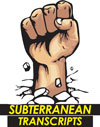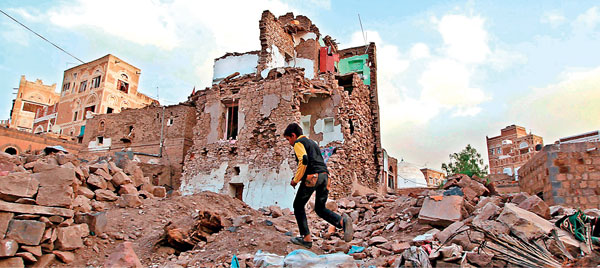Reply To:
Name - Reply Comment
 The word in the local streets is ‘heat’, and it comes with ‘blackouts’, ‘unannounced power cuts’, ‘sabotage-claims’ and ‘incompetence’. The word in the global streets is actually a proper noun: ‘Brussels’.
The word in the local streets is ‘heat’, and it comes with ‘blackouts’, ‘unannounced power cuts’, ‘sabotage-claims’ and ‘incompetence’. The word in the global streets is actually a proper noun: ‘Brussels’.
A few days ago, more than 30 people were killed and dozens injured in attacks at the Brussels international airport and a city metro station. Maybe it is because such attacks are a rarity in Europe (Compared to other parts of the world), we don’t know, but the Western press can’t seem to get enough of that story. ‘Brussels’ has hogged the world’s headlines and that must, at some level, say something about the world’s heads.
It is not unnatural for present-blood to hoof out other bloods of other times, but people do have memories and it’s not only about the fact of blood but its volume as well. The following note, titled ‘Sympathizing [with] Brussels and the colour divide’ that I received a few minutes ago via email, gives perspective:
‘The brutal IS bombing in Brussels deserves all the condemnation heaped on it, as well as the outpouring of sympathy for the victims. The point I wish to make is that the immensity of all this ha-ho is because it happened in a ‘white’ country and got [and yet gets] immense publicity from the Western Media – both print and electronic.
 ‘Ironically, hundreds of non-white Third Worlders are being killed daily in Syria, Libya, Yemen and Iraq by bombers from the US, UK, Russia, Turkey and Saudi Arabia. It is laughable to see the publicity awarded to the pilots of the “free world” who rain bombs on countries that do not have a single anti-aircraft gun. These victims are relegated to the small type of back pages.
‘Ironically, hundreds of non-white Third Worlders are being killed daily in Syria, Libya, Yemen and Iraq by bombers from the US, UK, Russia, Turkey and Saudi Arabia. It is laughable to see the publicity awarded to the pilots of the “free world” who rain bombs on countries that do not have a single anti-aircraft gun. These victims are relegated to the small type of back pages.
‘What shames me [is] the unseemly haste with which Third World leaders, including our own, rush to express their sympathy for the deaths of thirty odd ‘whites’. Not a tear have they shed for the fate of hundreds of non-white civilians mercilessly bombed by the “brave” (And totally safe) pilots of the “Free World”.’
Well, that’s the truth. People with a long view of history in addition to a wide-angle lens could of course talk of the Belgian monarch Leopold II, who carved out a territory more than 70 times larger than his own country and went on to kill 10-15 million people. That story of Belgium and the Congo Free State from the end of the 19th Century might sound out of place and a pernicious justification of the attack on Brussels a few days ago, but it is a pertinent interjection here simply due to the issue of selectivity: When we are taught about genocide, there’s scarcely any mention of Leopold.
The issue is simple. If not for the kind of selectivity referred to above, the attack-story is robbed of its tear-drawing worth. That’s politics and considering the fact of the political cussedness that marks the attack, footnoting or ignoring outright relevant histories is a political choice and has to be politically appraised. Put simply, ‘terrorism is terrorism, regardless of the identities of the terrorist or the victim’.
There’s bombing going on in Syria and South-Eastern Yemen, but we are told the guys getting hit are terrorists. No mention of civilians. By the way, more people died in Yemen than in Brussels on that same tragic day. That’s the political economy of coverage.

You can apply the logic to Sri Lanka’s struggle with terrorism too of course and there will be for-and-against arguments from all quarters. At the bottom of it is a simple word: Selectivity.
Let’s move from the ‘political’ arena for a moment. Let’s consider animal welfare. Let’s talk of people who are livid about cruelty to animals. A couple of weeks ago, there were cries of horror about some individuals who had captured, skinned and killed a hawk. We are also seeing objections to the use of elephants for pageants. The objectors have a point. A strong point. Few will stand up and say ‘It’s OK, they are after all animals’ (Implying ‘lesser beings’). Few, again, will say the victims of the Brussels attacks ‘deserved it’ or ‘it’s ok because others too have been killed’. The problem here is the selectivity concerning the beings in question. Can someone who eats fish and/or meat have the moral right to object to ‘the suffering inflicted on elephants in captivity’ or ‘a captured eagle’? Is the defence, ‘there’s legally sanctioned killing of certain animals, so our activism is framed by law’ really valid? If it’s the cruelty that inspires horror, there cannot be justification of certain kinds of violence based on method or degree of pain inflicted. The pig or the cow or the chicken or the goat that gets killed was not consulted about the eventuality, just as the hawk and the elephant were not.
Are dog shows cruelty-free? Do we assess this in terms of how many tails wagged and how much over a given period of time? How about horse and dog racing? ‘Kind treatment of animals,’ should we say? Isn’t captivity in any form (in a cage, in chains or on leash) cruel? Would it all be fine and would we be fine with it if we called them ‘pets’?
Isn’t it in the end about preferences, the outcomes we can live with or which suit us? Brussels is not ok, but Yemen is: elephants are no-no creatures, but horses, dogs, cattle, chicken, goats, pigs, fish, squid, prawns and crabs are yes-yes for capture, leashing, boiling, frying, currying, stewing and ‘devilling’ as the case may be.
Shouldn’t we all stand up now and pat ourselves on our backs and roar ‘Three hearty cheers for hypocrisy’? Well, that’s it folks. It’s not about horrible crimes against humanity and it is not about being aghast at animal-cruelty. It’s just us, being us, being hypocrites.
Malinda Seneviratne is a freelance writer whose work can be found on his blog, http://www.malindawords.blogspot.com/.